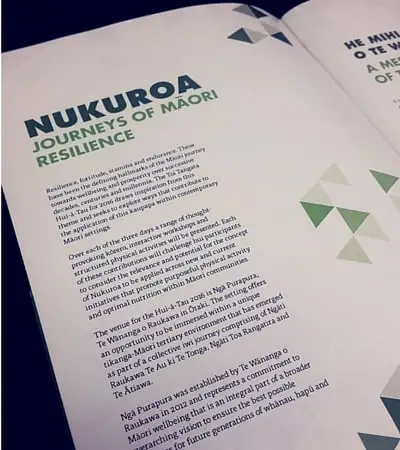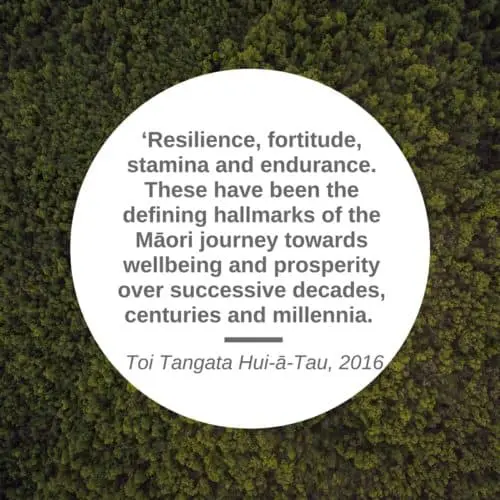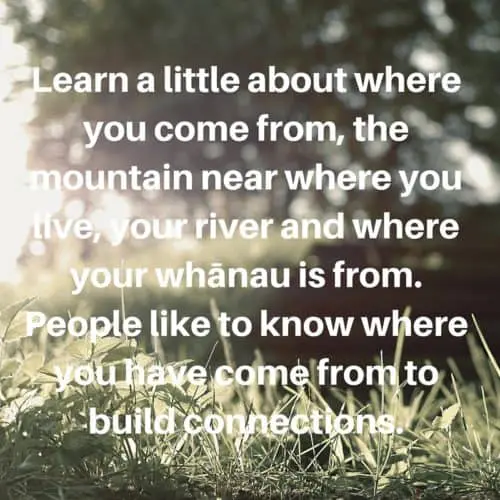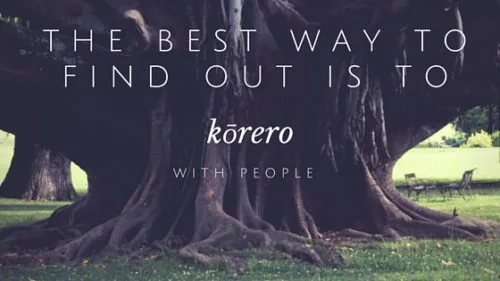Toi Tangata Hui-A-Tau 2016 — My learnings about Māori practice and etiquette
Ko Ruapehu tōku maunga
Ko Wanganui tōku awa
Ko Aotea tōku waka
Ko Ranana tōku marae
No Wanganui ahau, engari i pakeke au i Te Whanaganui-ā-tara
Ko Dayna ahau.

Earlier this year I attended Toi Tangata Hui-ā-Tau, a three-day hui with thought provoking kōrero, interactive workshops and structured physical activities. Each of these contributions challenged participants to consider the potential for the concept of Nukuroa to be applied across new and current initiatives that promote purposeful physical activity and optimal nutrition within Māori communities. Nukuroa loosely meaning bridging Māori principles and learnings with the western world and using both to make positive changes.

The hui was held at Te Wānanga o Raukawa in Ōtaki. The venue setting offered a unique opportunity for participants to be immersed within a tikanga-Māori environment. From this experience, I was reminded of the importance of spending time in preparation for the experience I was about to step into.
Below are a few prompts that I keep in mind when attending a hui of this nature, of course there are many resources out there and this is only a small snippet of things I consider when attending hui.
Be punctual to the Powhiri
It is polite to arrive early and wait for hosts to acknowledge your arrival by sending forth the first karanga, the call of welcome. This call is an oratory summons done by a high-ranking female elder in the host group as the first call of welcome. Arriving early also allows you to locate the speaker on your behalf to pass over your koha.
Koha (gift)
If you are attending a hui where it begins with a powhiri, it is always great to come along with a koha to gift to the tangata whenua (hosts). Yes as manuhiri (visitors) you may have paid to attend the hui, but a koha is another great way to show your thanks and appreciation. The koha (usually monetary) is presented by the speaker representing the manuhiri (visitors) and is received by a male or female from the host group (again it depends on the particular marae practices).
This koha will need to be given to the person doing the speaking on behalf of the visitors before the powhiri begins.
Hongi
The hongi is the process of sharing the breath of life which takes place after the powhiri formalities. Everyone lines up and gives each other a hongi / handshake or a kiss. The process starts by touching foreheads together, close your eyes if you wish and share the breathe of life together. This process is usually followed with a handshake or kiss.
Karakia before kai (Prayer / acknowledgement before eating)
At hui there will be a karakia to acknowledge the food and give thanks. However, this is not always done, so make sure you keep this in mind before getting your food and eating.
Seating
In a hui – sit at the front and then fill toward the back. This is to respect the speaker and keep everyone together
Eating – same as above but dependant on table configuration it’s best to fill tables middle out to the sides. This is to make it easy for people getting in to sit down.
Powhiri – again marae have different tikanga / protocols. It’s mainly common for woman to sit at the back and males to the front.
If you are ever unsure, it’s best to ask.
Pepeha
If there is an opportunity to introduce yourself, which in most cases there will be, it is best to come prepared with more than just your name and who you work for. Learn a little about you come from, the mountain near where you live, your river and where your whānau is from. People like to know where you have come from to build connections.
Below is a basic pepeha structure:
Ko _____________________ te maunga (mountain)
Ko _____________________ te awa (river near where you come from)
Ko _____________________ te waka (boat, plane, canoe in which brought you here to NZ)
Ko _____________________ te iwi (or family / tribe)
Ko _____________________ te marae (your marae if you have one)
No _____________________ ahau (where you come from)
Ko _____________________ ahau / tōku ingoa (who you are, your name)

These are only a handful of reminders when arriving to a hui hosted on a marae. Remember there are many resources out there to help you, however the best way to find out is to kōrero with to people from that area or marae. So being prepared is the best way to feel more comfortable to arrive, while honouring the culture and protocols of the marae.

Feel free to get in touch with any resources or thoughts that you find beneficial when on marae.

